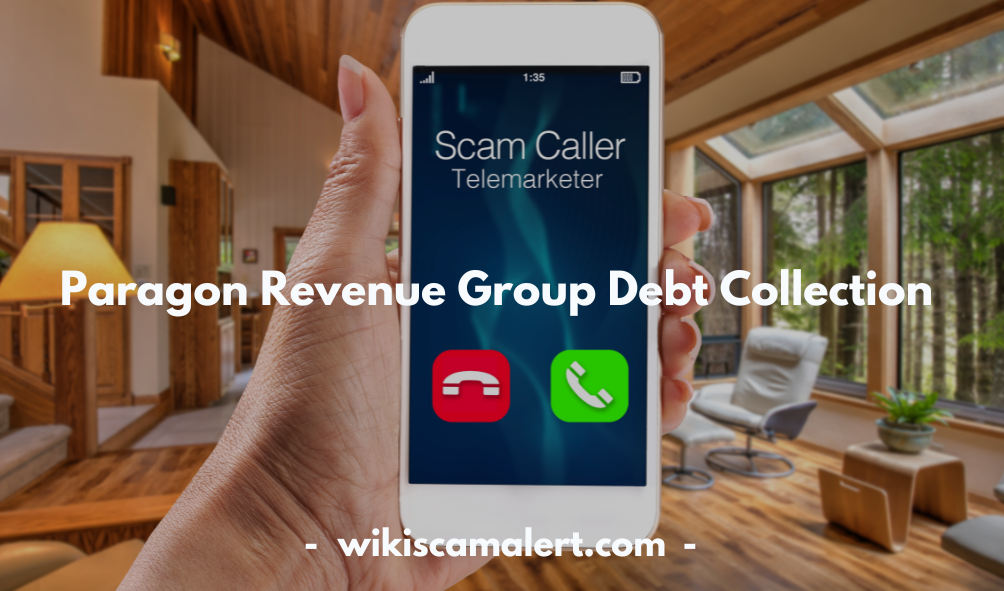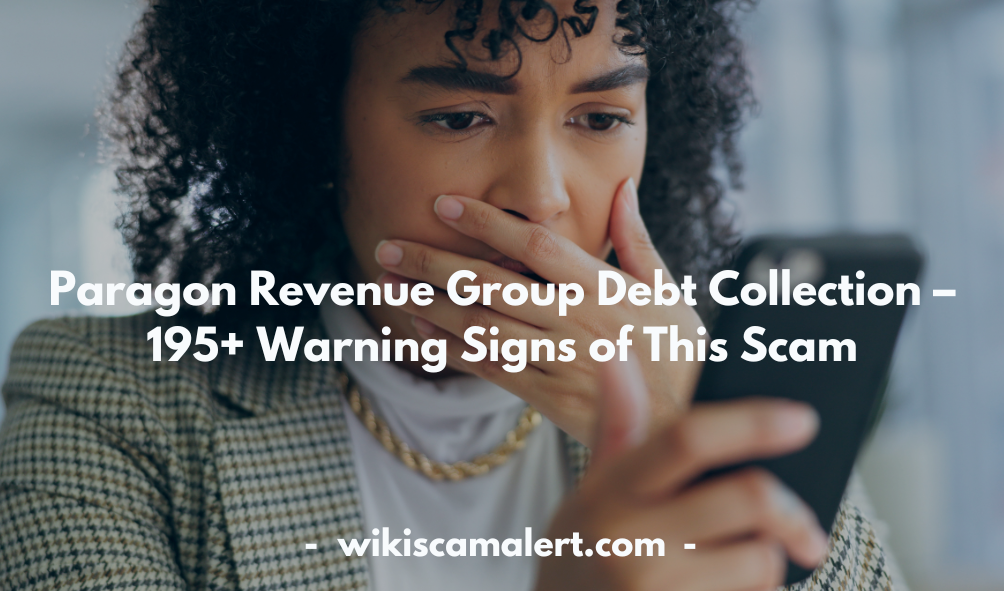Paragon Revenue Group is a well-known debt collection agency, but many consumers have reported questionable practices that raise red flags. Whether you’re receiving aggressive calls, unexpected collection notices, or threats over unpaid debts you don’t recognize, it’s crucial to know the warning signs of a potential scam. Scammers often pose as legitimate debt collectors to pressure individuals into paying money they don’t owe. In this article, we’ll break down five key warning signs to help you determine whether you’re dealing with a legitimate debt collection effort or a fraudulent scheme.

What is Paragon Revenue Group?
Paragon Revenue Group is a debt collection agency that contacts individuals regarding unpaid bills. They claim to collect debts on behalf of various companies, including medical institutions, service providers, and financial firms.
Why Are People Calling It a Scam?
Many consumers have reported aggressive collection tactics, incorrect debt claims, and even fraudulent activities. Some claim that they were pressured into paying debts they didn’t owe, leading to speculation that Paragon Revenue Group might not always operate within legal boundaries.
Paragon Revenue Group Scam Overview
- “Debt collectors should follow the law, not intimidate consumers. Paragon Revenue Group’s tactics raise serious concerns.”
- “When a debt collection agency operates in the gray area, consumers must be extra vigilant.”
- “If a collector refuses to validate your debt in writing, it’s a major red flag.”
- “Scammers thrive on fear. Knowledge is your best defense against deceptive debt collection practices.”
- “Not every debt collector is a scam, but verifying their claims is always a smart move.”
- “A legitimate debt collection agency provides transparency—if they don’t, question their legitimacy.”
- “Just because a company is registered doesn’t mean they’re ethical.”
- “Paragon Revenue Group’s aggressive tactics have left many questioning its credibility.”
- “Debt collection should be fair and legal—anything less is predatory.”
- “If they demand immediate payment without verification, they’re likely trying to scam you.”
Paragon Revenue Group Scam Complaints and Reviews
- “They kept calling me for a debt I had already paid off years ago—total harassment!”
- “Paragon Revenue Group threatened me with legal action over a debt that wasn’t even mine.”
- “I asked for written proof of my debt, and they refused. Huge red flag!”
- “I checked my credit report—no debt listed, yet Paragon Revenue Group keeps harassing me!”
- “Their representatives are rude and aggressive, making it impossible to have a civil conversation.”
- “I paid them out of fear, and now I realize it was a scam. Lesson learned!”
- “Legitimate companies don’t demand payment via gift cards or wire transfers. Stay alert!”
- “They called my relatives about a fake debt—completely unacceptable!”
- “I filed a complaint with the FTC. No consumer should be treated this way.”
- “The reviews speak for themselves—avoid Paragon Revenue Group at all costs!”
Paragon Revenue Group Scam Financial Impact
- “Scam debt collectors don’t just harass you—they can ruin your financial future.”
- “Falling for a fraudulent debt claim can drain your savings instantly.”
- “A fake debt collection charge can wreck your credit score if not disputed properly.”
- “Victims of scam debt collectors often pay hundreds or thousands for debts they never owed.”
- “The emotional toll of financial scams is just as damaging as the monetary loss.”
- “Every dollar paid to a scammer is a dollar stolen from your hard-earned income.”
- “Scammers prey on financial insecurity, making people more vulnerable to fraud.”
- “One false move with a fraudulent debt collector could lead to years of financial recovery.”
- “A little due diligence can save you from significant financial hardship.”
- “Debt collection scams don’t just cost money—they erode trust in legitimate financial institutions.”
Paragon Revenue Group Scam Customer Experiences
- “I never took out a loan, yet Paragon Revenue Group insists I owe them money.”
- “They kept calling at all hours, even on weekends. Isn’t that illegal?”
- “I told them I was recording the call, and they immediately hung up!”
- “They refused to send any documentation but kept demanding payment. Sounds like a scam to me.”
- “After I disputed the debt, they suddenly stopped contacting me. Suspicious, right?”
- “They tried to convince me I had a hospital bill from a city I’ve never even visited!”
- “When I asked for their company’s official registration details, they got defensive.”
- “Their scare tactics didn’t work on me—I knew my rights.”
- “If I didn’t know about the FDCPA, I might have fallen for their tricks.”
- “It felt like they were making up debts just to pressure people into paying.”
Paragon Revenue Group Scam Investigation Reports
- “Consumer watchdog agencies have received numerous complaints against Paragon Revenue Group.”
- “Authorities warn against debt collectors who refuse to provide written validation of debts.”
- “Regulators have flagged multiple debt collection agencies for deceptive practices.”
- “State attorney generals are cracking down on predatory debt collectors.”
- “Reports show a rising trend in fake debt collection scams targeting vulnerable consumers.”
- “Several consumers have taken legal action against Paragon Revenue Group for harassment.”
- “Government agencies urge consumers to verify debts before making any payments.”
- “Debt collection fraud is a billion-dollar industry—stay alert to avoid being a victim.”
- “The Fair Debt Collection Practices Act exists to protect consumers from abuse.”
- “Investigations into debt collection fraud are ongoing—always report suspicious activity.”
Paragon Revenue Group Scam Warning Signs
- “If a debt collector refuses to provide written proof of your debt, that’s a major red flag.”
- “Legitimate agencies don’t threaten arrest—only scammers use fear as a tactic.”
- “Always verify a collector’s identity before making any payments.”
- “Be wary of aggressive phone calls demanding immediate payment.”
- “If a collector pressures you to pay via gift cards or wire transfers, walk away—it’s likely a scam.”
- “Real debt collectors allow you to dispute a debt. Scammers demand payment without question.”
- “A sudden call about an old or unknown debt should make you skeptical.”
- “Check with the original creditor before paying a debt you don’t recognize.”
- “Scam debt collectors often use generic names to sound official—research them.”
- “If a collector threatens legal action but refuses to provide details, it’s likely a scam.”
Paragon Revenue Group Scam Legal Actions
- “Many consumers have taken legal action against debt collectors violating their rights.”
- “Filing a complaint with the CFPB or FTC can help expose fraudulent collection practices.”
- “Under the FDCPA, consumers can sue debt collectors for harassment and misrepresentation.”
- “Class-action lawsuits against debt collectors highlight systemic violations in the industry.”
- “If a collector violates your rights, legal experts recommend keeping detailed records.”
- “Debt collectors who falsely claim legal authority can face serious legal consequences.”
- “Some lawsuits against debt collectors have resulted in significant financial penalties.”
- “Consumers have successfully won settlements against agencies that engaged in deceptive practices.”
- “Taking legal action can stop harassment and hold fraudulent debt collectors accountable.”
- “State and federal laws protect consumers from abusive debt collection tactics.”
Paragon Revenue Group Scam and FDCPA Violations
- “The Fair Debt Collection Practices Act (FDCPA) protects consumers from abusive collection tactics.”
- “If a collector contacts you at odd hours, they may be violating the FDCPA.”
- “Under the FDCPA, debt collectors cannot threaten you with jail time or lawsuits they won’t pursue.”
- “FDCPA violations include harassing phone calls, false claims, and refusal to validate debts.”
- “You have the right to dispute a debt under the FDCPA—don’t let collectors tell you otherwise.”
- “If a debt collector keeps calling after you request written proof, they may be breaking the law.”
- “The FDCPA limits who collectors can discuss your debt with—sharing details with third parties is illegal.”
- “Filing an FDCPA violation complaint can lead to fines or penalties against dishonest debt collectors.”
- “Collectors who use deceptive tactics to pressure consumers often end up facing FDCPA lawsuits.”
- “Every consumer should know their FDCPA rights to protect themselves from unlawful debt collection.”
Paragon Revenue Group Scam Fraudulent Practices
- “Scammers often pose as legitimate debt collectors to trick consumers into paying fake debts.”
- “Some fraudulent debt collectors use fake case numbers to make their claims sound real.”
- “Fraudulent collectors may try to collect on debts that have already been paid or don’t exist.”
- “Using intimidation and threats is a classic sign of a debt collection scam.”
- “Fake debt collectors rely on urgency—legitimate ones follow legal procedures.”
- “Some scammers buy old or inaccurate debt records to pressure people into paying.”
- “Never pay a debt collector who refuses to provide their business name and contact information.”
- “Fraudulent agencies often use spoofed numbers to make it look like they’re calling from an official source.”
- “A legitimate debt collector should never ask for your bank account details over the phone.”
- “If a collector threatens violence or extreme consequences, report them immediately.”
Paragon Revenue Group Scam Debt Collection Tactics
- “Many debt collectors use intimidation tactics to pressure consumers into making payments.”
- “Repeated calls, even after being asked to stop, are a common harassment tactic.”
- “Collectors often use psychological pressure, making people feel guilty or fearful.”
- “Threatening lawsuits, wage garnishment, or asset seizure without proper legal authority is a scare tactic.”
- “Some collectors purposely use confusing legal jargon to intimidate consumers.”
- “A common trick is to insist that you must pay immediately, without time to verify the debt.”
- “Debt collectors may try to convince you that your credit score will be ruined if you don’t pay right away.”
- “Some collection agencies make false claims about working with law enforcement.”
- “Collectors often use pressure tactics like demanding a ‘good faith’ payment.”
- “A real debt collector provides documentation—scammers rely on fear and confusion.”
Paragon Revenue Group Scam Consumer Protection Tips
- “Knowledge is your best defense—understand your rights under the Fair Debt Collection Practices Act (FDCPA).”
- “Always request written validation of any debt before making payments.”
- “Never share personal or financial information with a debt collector over the phone.”
- “If a collector refuses to provide proof of your debt, report them immediately.”
- “Legitimate debt collectors will never demand payment via gift cards or wire transfers.”
- “Check your credit report regularly to catch any fraudulent debt claims early.”
- “Record all interactions with debt collectors for potential legal protection.”
- “Scammers rely on fear—stay calm and verify every claim before responding.”
- “If a debt collector threatens you, they are likely breaking the law—report them.”
- “Consult with a consumer rights attorney if you feel you’re being harassed.”
Paragon Revenue Group Scam Victim Stories
- “I paid a debt I didn’t even owe, only to find out later it was a scam.”
- “They called me multiple times a day, threatening legal action if I didn’t pay immediately.”
- “I asked for written proof of the debt, and they refused—huge red flag!”
- “They told me my wages would be garnished, but my lawyer said that was a lie.”
- “A fake collector from Paragon Revenue Group convinced me to pay through a wire transfer—money gone!”
- “I checked my credit report and found no record of the debt they claimed I owed.”
- “The so-called ‘debt collector’ couldn’t even tell me the original creditor’s name.”
- “After blocking their number, they started calling my family members—completely illegal!”
- “They kept changing their story when I asked for more details, which made me suspicious.”
- “It took me months to clear up the fraudulent debt claim they placed on my credit report.”
Paragon Revenue Group Scam and Credit Score Impact
- “A false debt report can tank your credit score—always dispute fraudulent claims.”
- “One inaccurate collection account can drop your credit score by over 100 points.”
- “You have the right to dispute any debt that appears on your credit report unfairly.”
- “A fake debt on your report can make it harder to get loans, apartments, and even jobs.”
- “If Paragon Revenue Group falsely reports a debt, demand written proof and file a dispute immediately.”
- “A debt collection entry stays on your credit report for up to seven years unless removed.”
- “Never ignore a fraudulent debt on your report—it can snowball into bigger financial issues.”
- “Request a free annual credit report to check for false debt collection entries.”
- “Scammers use fake debts to manipulate your credit history—always investigate suspicious claims.”
- “Your financial future depends on an accurate credit report—fight back against fraud!”
Paragon Revenue Group Scam How to Report
- “Report fraudulent debt collectors to the Federal Trade Commission (FTC) immediately.”
- “File a complaint with the Consumer Financial Protection Bureau (CFPB) if you feel scammed.”
- “Your state’s Attorney General’s office can investigate fake debt collection practices.”
- “Keep all records of conversations, emails, and letters from the debt collector.”
- “Notify the original creditor if you suspect the debt collection is fraudulent.”
- “A complaint with the Better Business Bureau (BBB) can help expose shady collectors.”
- “Consider legal action if you have suffered financial harm from a scam collector.”
- “Alert local law enforcement if you receive threats or harassment from a fake collector.”
- “Contact credit bureaus to dispute any fraudulent debt claims placed on your report.”
- “Educate others by sharing your experience online to prevent more victims.”
Paragon Revenue Group Scam Law Enforcement Involvement
- “Many fraudulent debt collectors have been shut down by the FTC and state regulators.”
- “Local police can take action if a debt collector threatens violence or fraud.”
- “The FBI investigates large-scale debt collection fraud cases across the country.”
- “If you suspect a scam, report it to the FTC—every complaint helps build a case.”
- “State attorneys general have sued fraudulent debt collectors for illegal practices.”
- “Illegal debt collection tactics can result in hefty fines and criminal charges.”
- “Scammers rely on victims staying silent—report them to the authorities!”
- “Debt collectors who violate the FDCPA can be forced to pay compensation to victims.”
- “Class-action lawsuits have been filed against abusive debt collection agencies.”
- “You don’t have to fight alone—government agencies exist to protect consumers from fraud.”
Paragon Revenue Group Scam Recovery Steps
- “The first step in recovery is understanding that you are not alone—many have fallen victim to fraudulent debt collection tactics.”
- “Always demand written proof of any debt before making payments to protect yourself from scams.”
- “If you’ve been scammed, report the incident immediately to the FTC and your state’s attorney general.”
- “A crucial recovery step is checking your credit report to ensure no unauthorized accounts have been opened in your name.”
- “Disputing a fraudulent debt is your legal right—exercise it to prevent financial damage.”
- “Never ignore debt collection calls, but always verify the legitimacy before responding.”
- “Keeping records of all communication with debt collectors can strengthen your case in legal disputes.”
- “If you have already paid a scammer, contact your bank or credit card company to attempt a chargeback.”
- “Consulting a consumer protection attorney can help you navigate debt collection fraud cases effectively.”
- “Empower yourself by learning about the Fair Debt Collection Practices Act (FDCPA) and your rights as a consumer.”
Paragon Revenue Group Scam Awareness and Education
- “Knowledge is the best defense—educate yourself on debt collection scams to avoid becoming a victim.”
- “Understanding your rights under the FDCPA can prevent you from falling for fraudulent collection tactics.”
- “Debt collectors must provide written validation of debts—never trust a call alone.”
- “Awareness campaigns help consumers recognize red flags in suspicious debt collection calls.”
- “Scammers thrive on fear and intimidation—knowing your rights eliminates their power over you.”
- “Public awareness of fraudulent debt collectors can help protect vulnerable individuals from financial harm.”
- “Never pay a debt without first verifying it—education is your greatest tool against fraud.”
- “Social media and online forums can serve as powerful platforms for sharing scam warnings.”
- “Teaching financial literacy in schools can prevent future generations from becoming scam victims.”
- “An informed consumer is a scammer’s worst enemy—stay educated, stay protected.”
Paragon Revenue Group Scam Prevention Strategies
- “Verify, verify, verify—always confirm a debt before making any payments.”
- “A legitimate debt collector will never threaten you with arrest or legal action over the phone.”
- “Protect yourself by refusing to provide personal or financial information to unknown callers.”
- “Blocking harassing scam calls can prevent continued intimidation attempts.”
- “Research any debt collection agency before engaging in conversation or making payments.”
- “Registering your number on the National Do Not Call list can help minimize scam attempts.”
- “Stay ahead of scammers by monitoring your credit report for suspicious activity.”
- “If a collector refuses to provide written validation of a debt, that’s a major red flag.”
- “Trust your instincts—if something feels off about a debt collection call, investigate further.”
- “Regularly updating passwords and securing sensitive financial information reduces fraud risks.”
Paragon Revenue Group Scam Industry Reputation
- “A debt collection agency’s reputation is built on trust—once that is lost, legitimacy is questioned.”
- “Consumer complaints are often the strongest indicator of a company’s ethical standing.”
- “Regulatory violations can tarnish the credibility of any debt collection firm.”
- “Reputable agencies follow legal guidelines, while shady firms rely on threats and deception.”
- “Online reviews reveal real consumer experiences—always research a company before engaging with them.”
- “Companies with multiple fraud complaints often operate in legal gray areas.”
- “Trustworthy debt collectors work transparently and never demand immediate payments.”
- “A company’s standing with the Better Business Bureau (BBB) can indicate its legitimacy.”
- “A history of lawsuits against a company is a warning sign of unethical practices.”
- “Ethical debt collection should prioritize clear communication and compliance with laws.”
Paragon Revenue Group Scam Contact and Communication Patterns
- “Legitimate debt collectors will always provide written notice of your debt before demanding payment.”
- “Repeated calls from different numbers with the same demand? That’s a classic scam pattern.”
- “A debt collector who refuses to identify their company should immediately raise red flags.”
- “Emails from fraudulent collectors often contain generic greetings, poor grammar, and pressure tactics.”
- “If a collector asks for payment via gift cards or cryptocurrency, it’s almost certainly a scam.”
- “Authentic debt collection agencies will always allow you to verify their claims through official channels.”
- “If a caller refuses to provide their full name or company information, do not engage further.”
- “Scammers often use fake caller IDs to appear as legitimate agencies—always double-check their credentials.”
- “Threats of jail time, lawsuits, or wage garnishment over the phone are major warning signs.”
- “Real debt collectors will never demand payment without providing sufficient documentation first.”
How to Protect Yourself from Debt Collection Scams
- Know Your Rights Under the FDCPA – You are protected against harassment and fraudulent claims.
- Monitor Your Credit Report Regularly – Check your credit history for any unrecognized debts.
- File Complaints Against Fraudulent Collectors – Reporting scams helps prevent others from falling victim.
Legal Actions Against Fraudulent Debt Collectors
- How to Sue for Harassment and Misrepresentation – If a collector violates your rights, you may have grounds for a lawsuit.
- Understanding Compensation and Remedies – Consumers can recover damages if a collection agency breaks the law.
Conclusion
While Paragon Revenue Group is a legitimate debt collection agency, numerous complaints suggest questionable practices. If you are contacted, always verify the debt before making any payments. Education is the best defense against scams. By knowing your rights and understanding how legitimate collectors operate, you can avoid falling victim to fraud. For a deeper dive into scam investigations, check out this detailed report on the biggest scams of 2025.
FAQs
How do I know if a debt collector is legitimate?
Always ask for written proof of the debt and verify their credentials with official agencies.
Can I refuse to pay a debt if I suspect it’s a scam?
Yes, you have the right to dispute any debt until it is verified.
What should I do if I have already paid a fake debt collector?
Contact your bank immediately and report the fraud to the authorities.
How can I report fraudulent debt collection practices?
File complaints with the FTC, CFPB, and state attorney general offices.
Does Paragon Revenue Group have a history of scams?
While they are a registered business, complaints about their aggressive tactics raise concerns.










